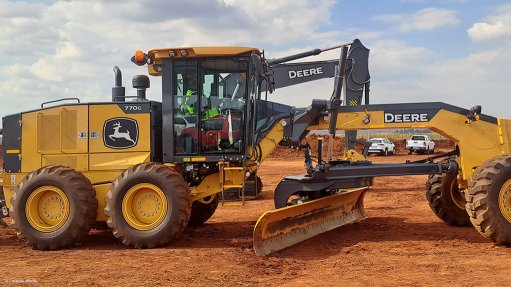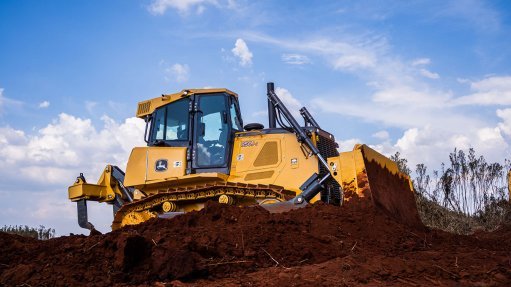The rise of AI in Africa
An extraordinary visitor graced the Creative Industry Summit, which was held in the Egyptian capital of Cairo last month. Like other attendees, she has a name and a nationality and is apparently well informed about current affairs. But, unlike everyone else, she was not born of flesh and blood. No, hers was not the second recorded virgin birth, after that of Jesus Christ more than 2 000 years ago – she is the handiwork of roboticists and artificial intelligence (AI) wizards at Hong Kong-based Hanson Robotics.
Sophia is the world’s first artificially intelligent robot to be granted a citizenship – she has been a Saudi Arabian passport holder since October last year. During the two days she spent in Cairo, she took the time to speak to summit delegates about the importance of AI and to grant media interviews. During one of the interviews, she sang the praises of Egyptian football maestro Mohamed Salah, who plies his trade in the English premier league, where he is a forward with Liverpool Football Club. She wished the Egyptian national team good luck at this year’s soccer World Cup tournament, to be held in Russia from June 15 to July 4.
The feats that Sophia is able to achieve are attributable to her AI, which enables her to maintain eye contact when she interacts with human beings, to recognise faces and to understand human language.
Naturally, for us in Africa, media reportage on Sophia’s sojourn in the Land of the Pharaohs brings to the fore a couple of questions: How far has the development and deployment of AI progressed on the continent? What will be the potential benefits, and will they outweigh the flip side?
As an overwhelming majority of African countries are still grappling with issues concerning the first, second and third industrial revolutions – including a huge mismatch between electricity availability and consumption, the mechanisation of production and automation – it is unsurprising that the continent is lagging many regions of the world in terms of AI adoption, and this will hinder its launch into the Fourth Industrial Revolution.
But it is inevitable that, one day, Africa will be up there with the rest of the world. The caveat, as Lexi Novitske, principal investment officer at Singularity Investment, a Nigeria-based investor in early-stage technology companies in sub-Saharan Africa, argues in a recent opinion piece, is that governments and other role-players should take the necessary measures to create a conducive environment. This includes ensuring that a favourable regulatory regime is in place and that youngsters coming out of the education system are a natural fit for employment in an AI-heavy economy.
Novitske also addresses the concern that AI will spell disaster for employment, on a continent where the masses of people who are out of a job are a big headache for governments. The argument here is that those whose work tasks involve rote manufacturing, for example, will find themselves being displaced by the many ‘Sophias’ that are sure to become a feature of many workplaces in the future. Such fears are not unfounded, with a report published by consulting firm McKinsey in December last year indicating that an estimated 13% of South Africa’s current workforce could be rendered jobless by automation in the not-too-distant future.
But, as Novitske points out, the large-scale deployment of AI will lead to increased worker productivity, empower workers by enabling them to take on more complex tasks, and ‘teach’ low-skilled workers complex skills. What’s more, robots could replace human beings in dangerous workplaces, such as underground mine workings, where the safety record leaves much to be desired.
AI could also be used to alleviate Africa’s significant shortage of healthcare professionals by enabling patients to upload their symptoms to an app, with the diagnosis received instantly. Besides improving healthcare efficiency, this enables doctors to treat those patients who really need an in-person consultation.
Remote diagnosis by means of AI is also possible for the agriculture sector.
Comments
Press Office
Announcements
What's On
Subscribe to improve your user experience...
Option 1 (equivalent of R125 a month):
Receive a weekly copy of Creamer Media's Engineering News & Mining Weekly magazine
(print copy for those in South Africa and e-magazine for those outside of South Africa)
Receive daily email newsletters
Access to full search results
Access archive of magazine back copies
Access to Projects in Progress
Access to ONE Research Report of your choice in PDF format
Option 2 (equivalent of R375 a month):
All benefits from Option 1
PLUS
Access to Creamer Media's Research Channel Africa for ALL Research Reports, in PDF format, on various industrial and mining sectors
including Electricity; Water; Energy Transition; Hydrogen; Roads, Rail and Ports; Coal; Gold; Platinum; Battery Metals; etc.
Already a subscriber?
Forgotten your password?
Receive weekly copy of Creamer Media's Engineering News & Mining Weekly magazine (print copy for those in South Africa and e-magazine for those outside of South Africa)
➕
Recieve daily email newsletters
➕
Access to full search results
➕
Access archive of magazine back copies
➕
Access to Projects in Progress
➕
Access to ONE Research Report of your choice in PDF format
RESEARCH CHANNEL AFRICA
R4500 (equivalent of R375 a month)
SUBSCRIBEAll benefits from Option 1
➕
Access to Creamer Media's Research Channel Africa for ALL Research Reports on various industrial and mining sectors, in PDF format, including on:
Electricity
➕
Water
➕
Energy Transition
➕
Hydrogen
➕
Roads, Rail and Ports
➕
Coal
➕
Gold
➕
Platinum
➕
Battery Metals
➕
etc.
Receive all benefits from Option 1 or Option 2 delivered to numerous people at your company
➕
Multiple User names and Passwords for simultaneous log-ins
➕
Intranet integration access to all in your organisation

















